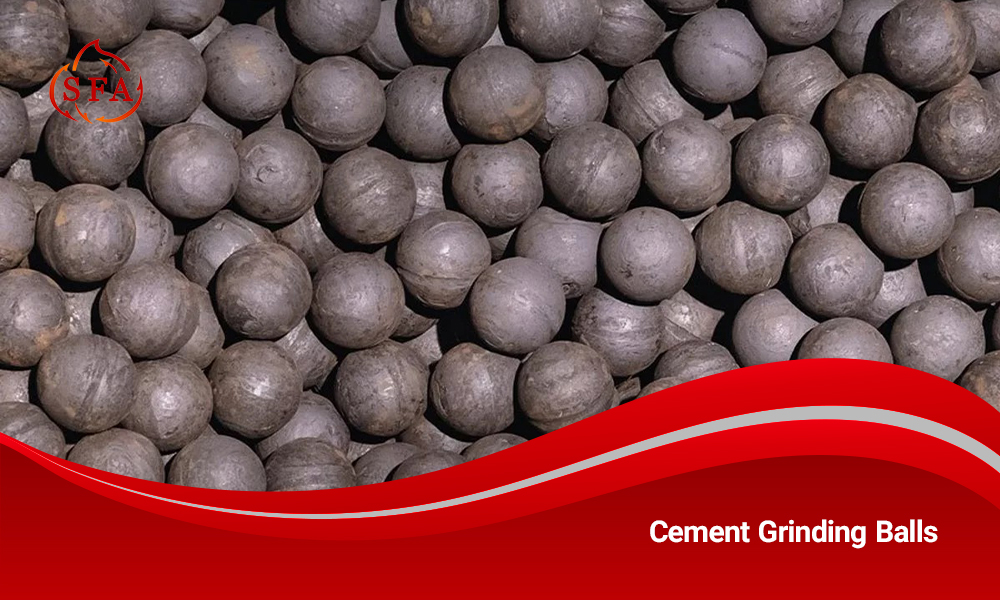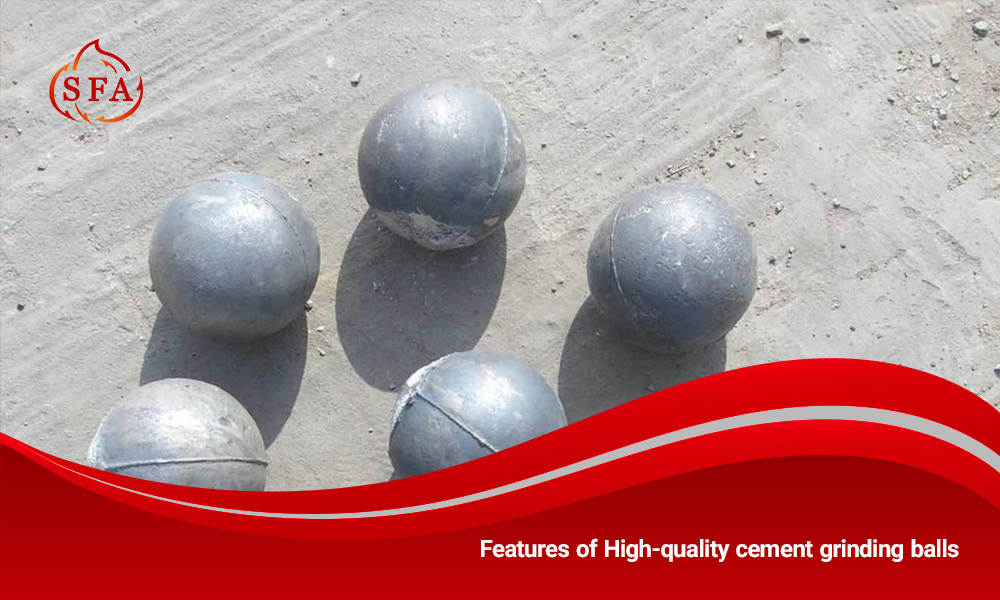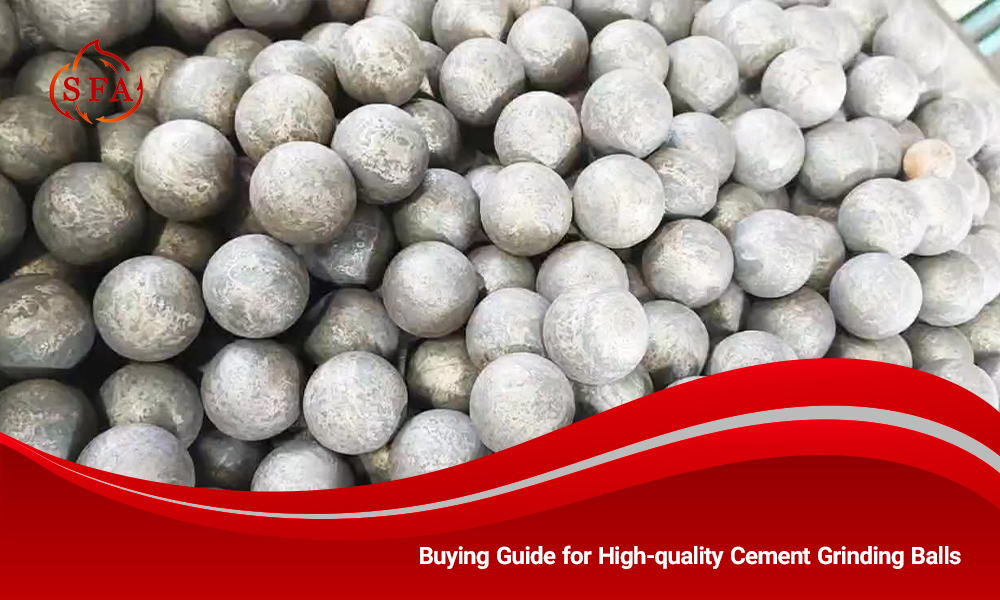

Cement Grinding Balls: Complete Guide to Types, Features, and Buying
The cement industry is one of the key foundations of infrastructure and modern construction. Among the many stages in cement manufacturing, grinding raw materials is the most energy-intensive and cost-demanding process. At the heart of this stage lie cement grinding balls, essential tools that crush and homogenize clinker, gypsum, and other additives.
These balls directly affect the uniformity, efficiency, and durability of the grinding process. As a result, choosing the right balls has a direct impact on cement quality, energy savings, and overall production costs.
In this comprehensive guide from Sepahan Atashgah Steel Foundry Industries, we will cover everything you need to know: definitions, types, features, production process, pricing factors, buying tips, FAQs, and even global market trends for cement grinding balls.
What are Cement Grinding Balls?
Cement grinding balls are spherical media used in ball mills to grind and refine raw materials into fine powder. Available in a range of sizes, materials, and densities, these balls serve different grinding purposes depending on mill type and process conditions.
Practical Value: High-quality balls reduce energy consumption, extend mill service life, minimize downtime, and improve the consistency of the final cement product.
Historically, ball mills were first introduced in the cement industry in the early 20th century. Over time, they replaced traditional grinding methods due to their efficiency and adaptability. Today, ball mills remain the most reliable solution for grinding hard materials in cement production.
Types of Cement Grinding Balls
Grinding balls come in multiple forms, each suited to specific raw materials and grinding conditions. Below is a detailed comparison:
| Type | Material | Chromium % | Resistance | Key Benefits | Typical Applications | Cost Level |
|---|---|---|---|---|---|---|
| Steel Balls | Carbon steel (heat-treated) | – | High abrasion & impact resistance | Long service life, toughness | Clinker & raw material grinding | 💲💲💲 |
| High-Chromium Cast Iron Balls | White cast iron | 12–30% | Excellent wear & corrosion resistance | Less brittle, precise particle size | Dry grinding processes | 💲💲💲💲 |
| Ceramic Balls | Alumina or Zirconia | – | Lightweight, high chemical resistance | Suitable for sensitive materials | Pharma, paint, ceramic industries | 💲💲💲💲💲 |
| Low-Chromium Cast Iron Balls | White cast iron | 1–5% | Moderate wear resistance | Lower cost option | General cement grinding | 💲💲 |
Cast vs. Forged Balls
- Cast Balls are produced by pouring molten metal into molds. They are cost-effective but may have internal porosity.
- Forged Balls are shaped through mechanical pressure at high temperatures, producing a denser structure and superior impact resistance.
Therefore, forged balls are generally preferred for heavy-duty, high-impact grinding operations, while cast balls serve as economical options in less demanding environments.
Click to read the article «Alloy Steel Grinding Balls».
Features of High-quality cement grinding balls
When evaluating grinding balls, several technical characteristics determine performance:
Energy Efficiency – High-quality balls transfer maximum impact to materials, reducing power usage.
Hardness and Uniformity – Consistent hardness from surface to core ensures long wear life and effective crushing.
Abrasion & Impact Resistance – High strength prevents premature breakage and protects mill liners.
Engineered Alloy Composition – Chromium enhances corrosion resistance; manganese improves impact toughness.
Perfect Shape & Size – A spherical, smooth surface guarantees uniform wear and efficient grinding.
Corrosion Resistance – Crucial for wet grinding and humid environments.


Why High-Quality Balls Lower Production Costs
Grinding represents 40–60% of total cement production costs. Using low-quality balls increases wear, replacement frequency, and downtime, while also damaging liners and mill equipment.
Case Example: A cement plant in the Middle East switched from low-chromium to high-chromium balls and achieved a 20% reduction in energy costs plus 30% longer liner life.
In conclusion, premium grinding balls are not just a purchase—they are a long-term investment in efficiency and sustainability.
Cement Grinding Balls Production Process
At Sepahan Atashgah Steel Foundry Industries, every ball undergoes strict quality control during the following stages:
- Raw Material Selection – Choosing alloys resistant to abrasion, heat, and impact.
- Metal Melting – Conducted in induction furnaces with precise chemical control.
- Shaping Methods:
- Casting: Economical, suitable for mass production.
- Forging: Produces denser, stronger, and longer-lasting balls.
- Heat Treatment – Hardening and tempering to balance surface hardness and core toughness.
- Machining & Quality Control – Dimensional checks, weight verification, hardness testing, and surface inspection.
- Packaging & Shipping – Industrial bags or steel drums, accompanied by technical data sheets and certificates.
Cement Grinding Balls Price Factors
Prices vary widely depending on:
- Alloy Content – More alloying = higher cost but better performance.
- Weight & Size – Larger, heavier balls cost more.
- Production Method – Forged > Cast (in both quality and price).
- Brand Reputation – Trusted manufacturers maintain quality and provide documentation.
Buying Cement Grinding Balls Online
Today, digital platforms make it easier than ever to purchase grinding balls directly from verified suppliers.
Benefits of Online Purchase
- Faster supplier access
- Wide variety of sizes & materials
- Transparent pricing & easy comparison
- Certificates & technical analysis included
Key Considerations Before Buying
- Seller credibility and customer reviews
- Matching specifications to your mill requirements
- Delivery time and logistics cost
- Warranty, after-sales support, and replacement policies
FAQs: Common Questions About Cement Grinding Balls
1. How often should grinding balls be replaced?
It depends on mill type, raw materials, and ball quality. On average, high-quality balls last 30–50% longer than standard ones.
2. Are forged balls always better than cast balls?
Not necessarily. Forged balls offer superior durability, but cast balls remain cost-effective for light-duty applications.
3. Do grinding balls affect cement strength?
Yes. Uniform particle size achieved with high-quality balls improves cement consistency and final compressive strength.
4. Can grinding balls be recycled?
Yes. Worn balls are often re-melted for new production, reducing waste and environmental impact.
Market Trends & Future Outlook
The global demand for cement grinding balls is rising due to:
- Rapid urbanization and infrastructure growth.
- Increased focus on energy-efficient grinding.
- Development of eco-friendly alloys with lower environmental impact.
By 2030, the global market for grinding media is projected to grow steadily, with forged balls gaining more market share thanks to their sustainability and long-term cost savings.
Why Choose Sepahan Atashgah Steel Foundry Industries?
With over 30 years of expertise in casting and grinding ball production, Sepahan Atashgah stands among the most trusted suppliers in the Middle East.
- Decades of hands-on industry experience
- Certified quality (ISO standards & international benchmarks)
- Global export record with satisfied clients
- Warranty, after-sales service, and technical consultation
Contact us today for a free consultation and order high-quality cement grinding balls online with guaranteed performance.


Buying Guide for High-quality Cement Grinding Balls
Choosing high-quality cement grinding balls increases production efficiency. High strength increases service life and reduces maintenance costs.
Sepahan Atashgah Steel Casting Industries Company, with years of experience in the field of producing and exporting Cement Grinding Balls, is one of the most reliable suppliers of High-quality cement grinding balls. Sepahan Foolad Atashgah Casting Industries Company has 7 furnaces with a total simultaneous melting of 20,000 kilograms in an area of 25,000 square meters, and has an annual production capacity of 25,000 tons of casting parts.
To purchase cement grinding balls online, you can easily place your order through this website or get in touch with our CEO and other team members.


